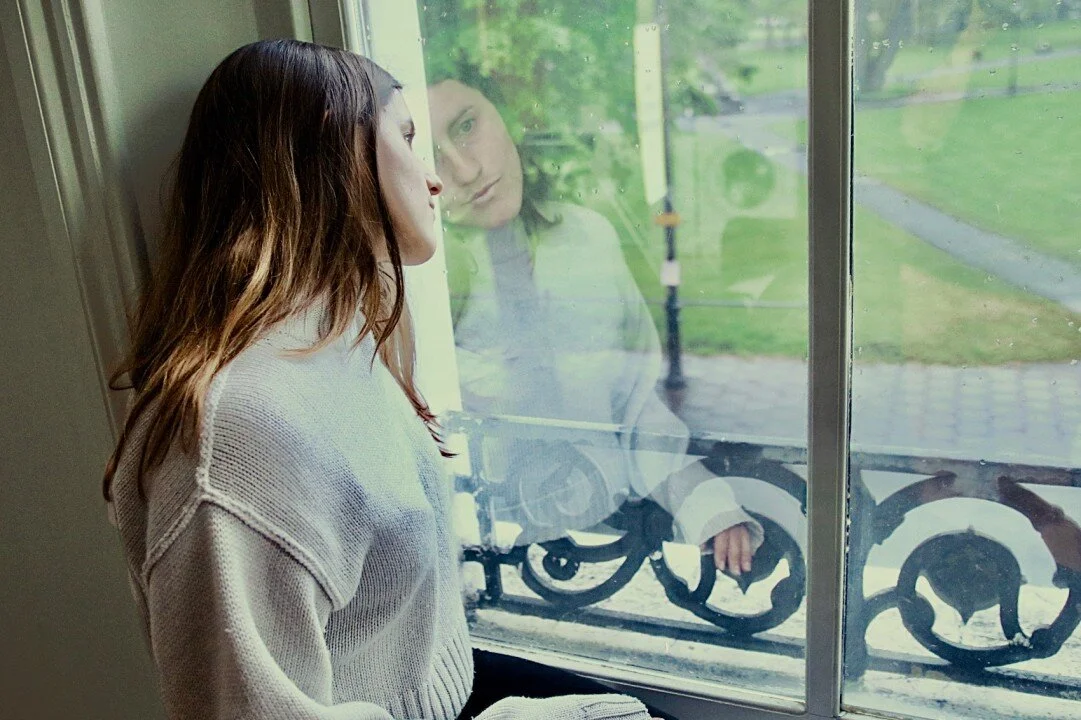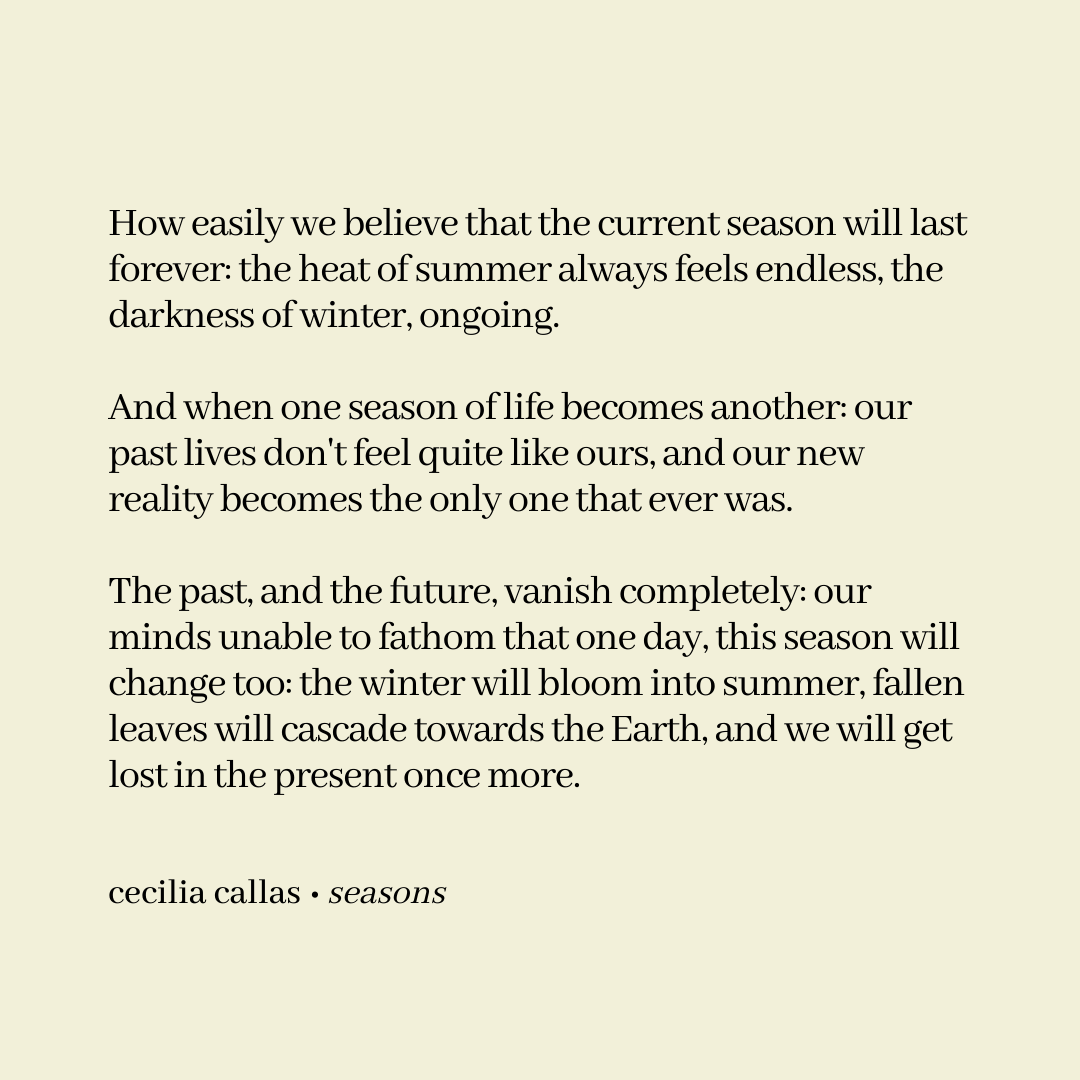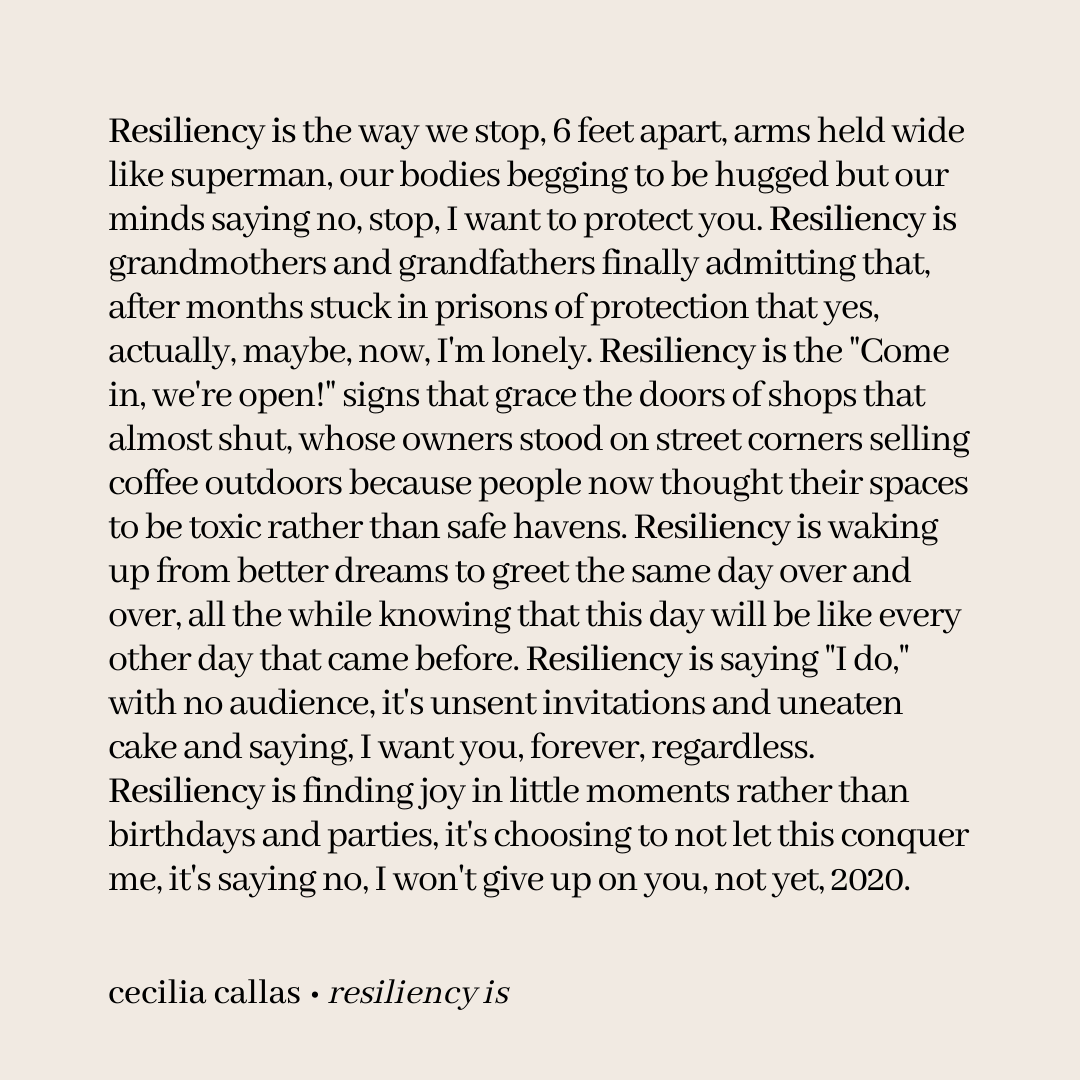Reigniting Imagination During a Global Pandemic
Cecilia looking out the window of her London apartment, where she’s been quarantining with her partner most of 2020.
Note: This post was contributed by writer and poet Cecilia Callas, as part of the the Blue Sky Mind Friendship Series. It was originally written in May 2020.
In the past few weeks, my world and everything in it has flipped upside down, like a roller coaster loop, or an egg timer just freshly flipped onto its opposite side, its sand now flowing in reverse. Friends that were a part of my daily existence, my everyday rituals -- my morning coffee friends, my walk to lunch friends, my gym class friends -- have suddenly evaporated, like a puff of smoke, a magic trick. The special formula I’d concocted for my day-to-day that could only lead to success (7 o'clock workout class, at work by 8:30, leave work at 6, some kind of social activity in the evening, lights out by 11) has dissipated, leaving only cavernous holes of time in its wake.
It happened so slowly at first: whispers of an office closure, of travel bans, of freedoms stripped bare, occurrences that were once so far away, someone else’s problem, began to permeate the four walls of my existence. The news flashed red day after day, event after event was cancelled, neatly: one email sent out to erase an entire potential experience from the future. Empty shelves at the shops, stripped bare by fear more than actual hunger, became commonplace, and real-life began to feel like an apocalyptic movie, like humanity was closing in on itself.
That fear and uncertainty rippled across the globe, like a pebble thrown into a placid pond: one entry point, with changes both above and beneath the surface, all over.
Now, the coffee shop where I made my second home is black and boarded up, the noisy pub down the street’s gone quiet. The church bells ring out from the bell tower above, but there are no worshippers inside to heed them. When the sun sets over the endless green in front of my window, it is littered with solo runners dodging oncoming walkers at harsh angles, with people walking in opposite directions, lost within themselves. All I can see is loneliness.
“Seasons” by Cecilia Callas
‘We’re in this together’ has become everyone’s favourite phrase, and yet, it feels only like we are drifting further and further apart, like driftwood from a sunken ship, a wreck in the middle of a navy blue darkness. We’re pieces of frayed wood, coming undone in the water, bobbing up and down, directionless. If we’re not careful, we’ll lose each other.
Since the lockdown began, we’ve retreated further and further inwards, the four walls of our homes becoming both our place of shelter and our place of captivity, all at once. The other day while out on my ‘once-a-day’ exercise, a fellow runner jogged up to me, motioning to me to remove my headphones. ‘You dropped your headband!’ he said with a kind smile, motioning to somewhere behind us. Somewhere within me, I felt the need to throw my arms around him, this kind stranger who didn’t want me to lose my headband.
‘Oh, thanks!’ I said brightly, smiling back. He seemed like he almost wanted to say more, but he didn’t, and I took off in the opposite direction, searching for the fallen piece of black cloth. As I doubled back, scouring the freckled green grass, it hit me that this stranger was the first person I had spoken to, in person, face-to-face, other than my partner, in over a month. And that that was why I had felt the unimaginable, inappropriate urge to throw myself around him: the human contact, of a stranger, someone real, flesh-and-blood, speaking to me -- I’d almost forgotten what it felt like.
Although human-on-human contact is a rare occurrence for me these days, I have plenty of interaction with myself. I am someone who has never had any problem being alone -- I leave parties early so that I can have a coveted few hours alone at the end of the night, reading my favourite novel. When I was younger, I used to sit in my room in the place where I grew, turn my great big armchair around to face the window, and sit. I’d stare out onto the street below: mothers pushing strollers, young kids roller skating past, sometimes falling to their knees before picking themselves up again. I’d watch as the teenager next door got into his rusty red pickup truck, rock anthems blaring, driving into the dusk.
“Quiet Pleasures” by Cecilia Callas
While doing so, I would make up stories. Stories that rarely left my head: they lived within me, and I loved escaping into them. There was the wild girl with dark brown hair and electric green eyes, new to the neighbourhood, who had a secret. There was the young horseback riding champion who lived on a ranch, her daily dramas similar to mine, but ever more so exciting in the setting of the Wild, Wild West. The characters and their stories were expressions of my imagination: a pool that went so deep, and so wide, that it truly felt limitless, an endless resource unbound by time or the laws of nature.
This time in my life was uncomplicated: I was fortunate to have an incredibly happy, simple childhood. I didn’t have any responsibilities, to anyone, except for my family: I had no dinners scheduled nor favourite coffee shops to sit in nor expensive workout classes to not miss. I actively chose to sit in my room, to stare out of the window, to ponder. I discovered the universe within myself and I liked living there: I enjoyed the freedom of it, the possibility of it.
Flash forward years and years later, and I sometimes wonder when my imagination stopped running wild, uncontrollable in nature.
I wonder when I succumbed to the reality that was in front of me rather than within me, when I gave up on the characters within my head. I miss them; I miss their beginnings and their lack of endings. I wonder when I let the strain, the routine of adult life kill them: when I morphed into a person who feels like she’s lost everything because these freedoms I’ve come to rely on have been taken away.
I think it must have been because of all of it, really. The growing up, the stimuli, the drama, the real-life story that I got, which was a pretty darn good one, one that the younger window-staring me couldn’t have imagined, much less articulated.
“Moments of Stillness” by Cecilia Callas
And yet. I can’t help but wonder what the kid me would make of this situation: what world would my imagination concoct? Maybe I’d be a princess, stolen away from the world and locked in her room, unable to roam free and find her destiny. Maybe I’d imagine a story in which a girl discovers the cure to the disease, but she can’t escape from a captor who has locked her up because of her genius. Maybe I wouldn’t be in this type of world at all, but someone free, her life completely untouched by pandemic, carrying on with her adventure, her mystery.
And just like that, I’ve entered a place where I haven’t been in awhile. It’s dark, and a bit dusty, a smooth layer of dust on the table tops, but nothing that a bit of sweeping won’t fix. It’s a place of opportunity and a place of dreams coming true: it’s my imagination roaring back to life, it’s the starting point where multiple storylines stem out from a single starting point. I find I now have the time, and the mental space, to explore each one of those starting points, and I can't wait to see where they take me.
I don't think I would have rediscovered this place of quiet creativity if it weren’t for the stillness, for the solace. If I didn't find myself staring out of windows again, just to pass the time. And even though I set out writing this determined to NOT end on a cheesy, ‘just look at the bright side of all of this!’ happy note, apparently that is exactly what I am doing.
“Resiliency Is” by Cecilia Callas
Because maybe this period of time can be used for more than worry, than sadness, than doubt. Maybe it can be used for good: for coming back to things, to encourage those technicolor pleasures to reappear where there’s only been darkness for so long, while we’ve all been absorbed in other things. Maybe it’ll be easier to come back to now, like singing your favourite song from when you were a teenager, one you haven’t heard in years: you can forget it all you want, but when you hear it again, you can’t stop yourself from singing every, single, line.
For me, that was rediscovering -- and reigniting -- my imagination, my inner child and the worlds inside of my head. For you, maybe it’s the same -- or maybe it’s art, history, nature, a fascination buried deep. And maybe you’ll rediscover it, bring it with you into the new world we’ll surely build once all of this is over. And if that’s not a silver lining, I don’t know what is.
Cecilia Callas is a writer and communicator by trade and a poet by passion. You can find more of her work at @byceciliacallas on Instagram.
Up next: What I’m Consuming During Quarantine





